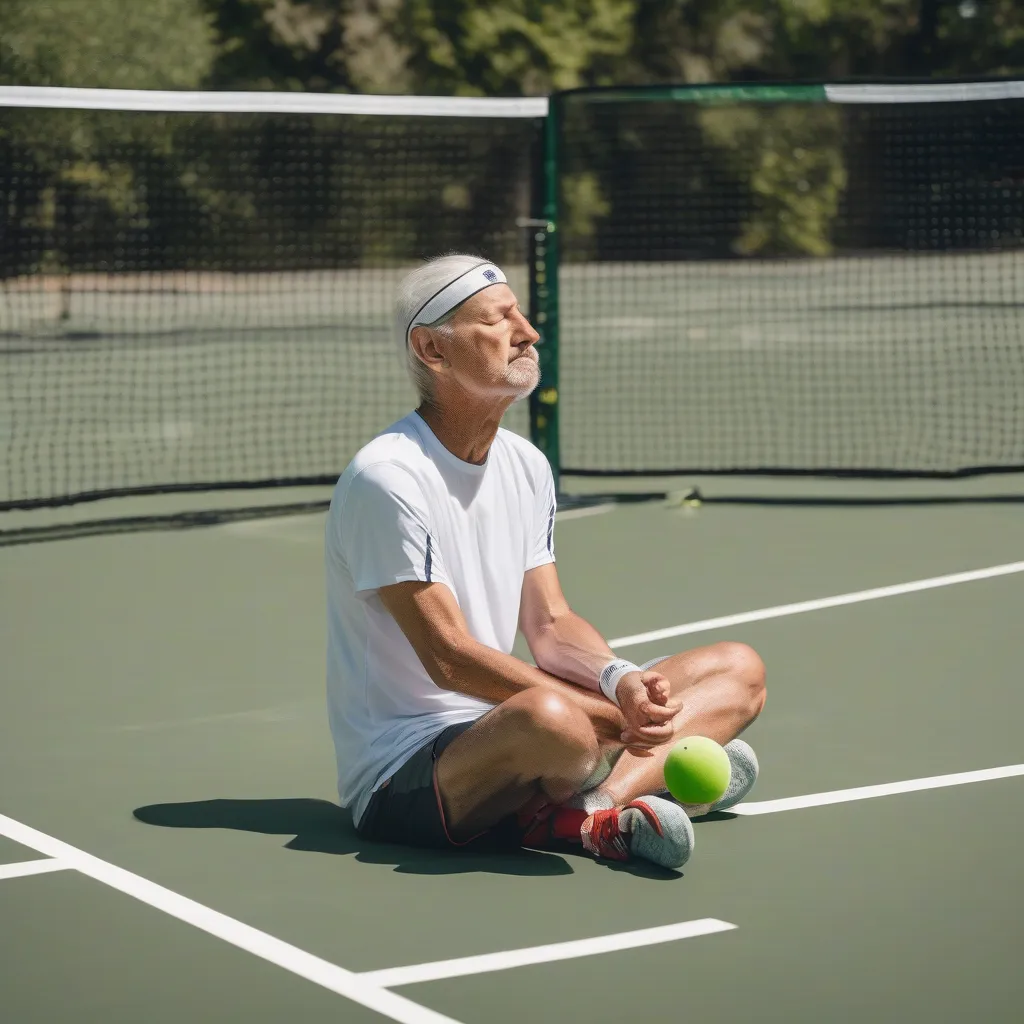Have you ever stepped onto the pickleball court for a crucial match, heart pounding, palms sweating, and mind racing? You’re not alone. The competitive nature of pickleball, while exhilarating, can also be a breeding ground for stress and anxiety. This article will delve into the causes of these feelings, provide practical strategies for managing them, and empower you to perform at your peak, even under pressure.
Understanding the Pressure Cooker: Why Competitive Pickleball Can Be Stressful
The fast-paced, dynamic nature of pickleball demands quick thinking and precise movements. Add the pressure of competition, whether it’s a local tournament or a friendly match with high stakes, and the mental game becomes just as important as the physical one. Several factors contribute to this pressure:
The Fear of Failure
Many competitive players experience a fear of letting themselves or their partners down. This fear can be crippling, leading to tense muscles, rushed shots, and unforced errors.
Performance Anxiety
The desire to perform well, especially in front of an audience, can trigger anxiety. This can manifest as negative self-talk, difficulty focusing, and an inability to execute learned skills.
High Expectations
Putting too much pressure on yourself to win can create a stressful environment. Remember, even professional athletes have off days.
External Pressures
Factors like rankings, sponsorships, or pressure from coaches and teammates can add to the mental burden.
Mastering the Mental Game: Strategies for Managing Stress and Anxiety
So, how do you tame these mental monsters and bring your A-game to the court? Here are some effective strategies:
Mindfulness and Meditation
Practicing mindfulness can help you stay present and focused on the game, rather than dwelling on past mistakes or worrying about future outcomes. Even a few minutes of daily meditation can make a difference. As renowned sports psychologist Dr. Jim Loehr says, “The present moment is the only moment any of us ever has to work with.”
Breathing Exercises
Deep, controlled breathing can calm your nervous system and reduce physical symptoms of anxiety like rapid heartbeat and shallow breathing. Try the 4-7-8 technique: inhale for 4 seconds, hold for 7 seconds, and exhale for 8 seconds.
Visualization
Visualizing yourself performing well can boost your confidence and reduce anxiety. Imagine yourself executing perfect serves, making winning shots, and staying calm under pressure.
Positive Self-Talk
Replace negative thoughts with positive affirmations. Instead of thinking, “I’m going to miss this serve,” tell yourself, “I’m going to serve this ball with power and accuracy.”
Pre-Game Routine
Developing a consistent pre-game routine can help you get into the right mindset and minimize anxiety. This could include listening to music, warming up specific muscles, or practicing visualization techniques.
Focus on the Process, Not the Outcome
Shifting your focus from winning to playing your best can take the pressure off and allow you to enjoy the game more. Celebrate small victories and learn from mistakes without dwelling on them.
Seek Support
Don’t be afraid to talk to a sports psychologist or counselor if you’re struggling with anxiety. They can provide personalized strategies and support to help you manage your mental game.
Fueling Your Performance: The Role of Nutrition
As a Registered Dietitian and meal prep coach, I can’t stress enough the importance of proper nutrition in managing stress and anxiety. A balanced diet rich in whole foods, lean protein, healthy fats, and complex carbohydrates can help stabilize blood sugar levels and provide your body with the nutrients it needs to function optimally.
Foods to Incorporate:
- Complex Carbohydrates: Oatmeal, brown rice, quinoa
- Lean Protein: Chicken, fish, beans, lentils
- Healthy Fats: Avocado, nuts, seeds
- Fruits and Vegetables: A variety of colorful produce
Foods to Avoid:
- Processed Foods: Sugary snacks, fast food
- Excessive Caffeine: Can exacerbate anxiety
- Alcohol: Can disrupt sleep and increase stress
Putting it All Together: A Holistic Approach
Managing stress and anxiety in competitive pickleball requires a holistic approach that addresses both the mental and physical aspects of the game. By incorporating these strategies into your training and competition routine, you can gain control of your mental game, enhance your performance, and, most importantly, enjoy the thrill of competition.
 Managing Stress in Pickleball
Managing Stress in Pickleball
- MURPHY, JIM (Author)
- English (Publication Language)
- Afremow, Jim (Author)
- English (Publication Language)
- Horne, Troy (Author)
- English (Publication Language)
- Perry, John (Author)
- English (Publication Language)
- This product will be an excellent pick for you.
- It is durable and long lasting
- Author: W. Timothy Gallwey.
- Publisher: Random House Trade Paperbacks
- Rotella, Dr. Bob (Author)
- English (Publication Language)
- Donnelly, Darrin (Author)
- English (Publication Language)
- Weinberg, Robert S. (Author)
- English (Publication Language)
- Simpson, Andrew (Author)
- English (Publication Language)
Conclusion
From breathing exercises to visualization and mindful eating, we’ve covered a range of techniques to help you manage stress and anxiety on the pickleball court. Remember, the key is consistency. By practicing these strategies regularly, you can build mental resilience, improve your performance, and truly enjoy the game. What techniques resonate most with you? Share your thoughts and experiences in the comments below. We can all learn from each other! Don’t forget to share this article with your fellow pickleballers and let’s create a more positive and supportive competitive environment together. Looking for more tips on optimizing your pickleball game? Check out our related articles on nutrition and training strategies.









